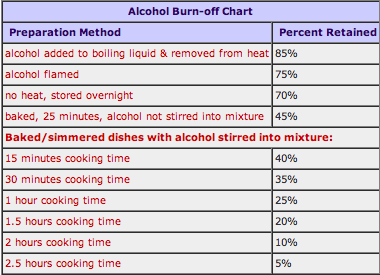Cooking with Alcohol
When someone tastes the dish I prepare and when I educate them that there is alcohol in the dish, people usually just shrug it off and say “It’s alcohol, it has evaporated.” Well, that is true up to a certain point. You see, depending on the cooking method and for how long you cook a dish, it will greatly impact the remaining percentage of the alcohol. With that being said, it does not mean that you will get drunk if you consume a dish that has been prepared with alcohol.
This is very important to know, especially if you are dealing with people who have allergies or have just recently stopped drinking due to health issues.
Let’s look at this chart which will explain what exactly I am trying to explain here:
When looking at the chart, what does this mean? It’s very simple. Cooking methods that include short and quick cooking, obviously retains the most alcohol. The common misconception that I have seen among people is that if you flambé something, most of the alcohol is gone.
If you are not familiar with the term flambé allow me to explain it. It is a cooking procedure which involves a hot pan and high proof alcohol. Once you combine the two you create a burst of flames. Flambé is usually done at table sides in a restaurant for the wow effect and also for additional flavor. Flambéing can infuse a dish with additional aroma and flavor, while burning off some of the alcohol content. Granted this cannot be accomplished with beer.
So what about beer? What happens if you make that stew with beer? How does that affect the overall taste?
Stew is a combination of solid ingredients that have been cooked in a liquid and the overall dish is served with the cooking liquid. There are many ingredients that stew can include (vegetables, meat, poultry, seafood), and also the cooking liquid does not have to include water, necessarily. Some of the acceptable ingredients are wine, stock and also beer. While the stews are cooked on a low temperature for a long time, this allows the flavors to become richer. Do not forget that also less percentage of the alcohol will be retained in the final dish.
Every once in a while I make a beer ice cream. What about that? how does the alcohol affect the taste of the ice cream?
Granted the beer is cooked for about 10 minutes on a medium heat on the stove, but if you look at the chart, that means that approximately 40% of the alcohol content remained in the final product.
Since I can keep on rambling about this subject all day long, let me conclude this post for now. What am I trying to say in the end? Inform your guests of the ingredients you have used in your dishes, just in case someone is allergenic to something. Just because you have “cooked” the alcohol, it does not mean that it is all gone. Help spread the word and when someone tells you next time that the alcohol is evaporated, please correct them. There are lots of misconceptions about food going around. Especially when you combine alcohol!
